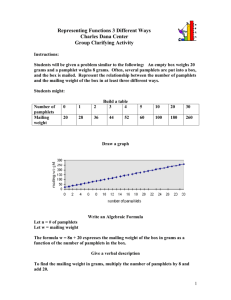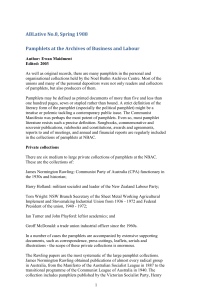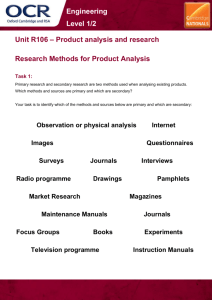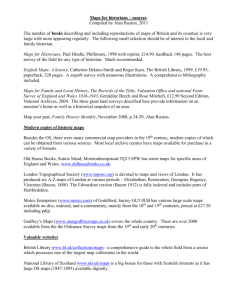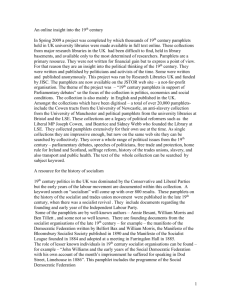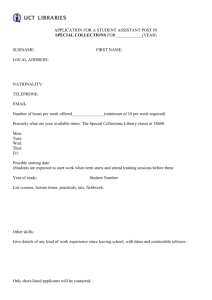19th Century Pamphlets Online Digitisation Project
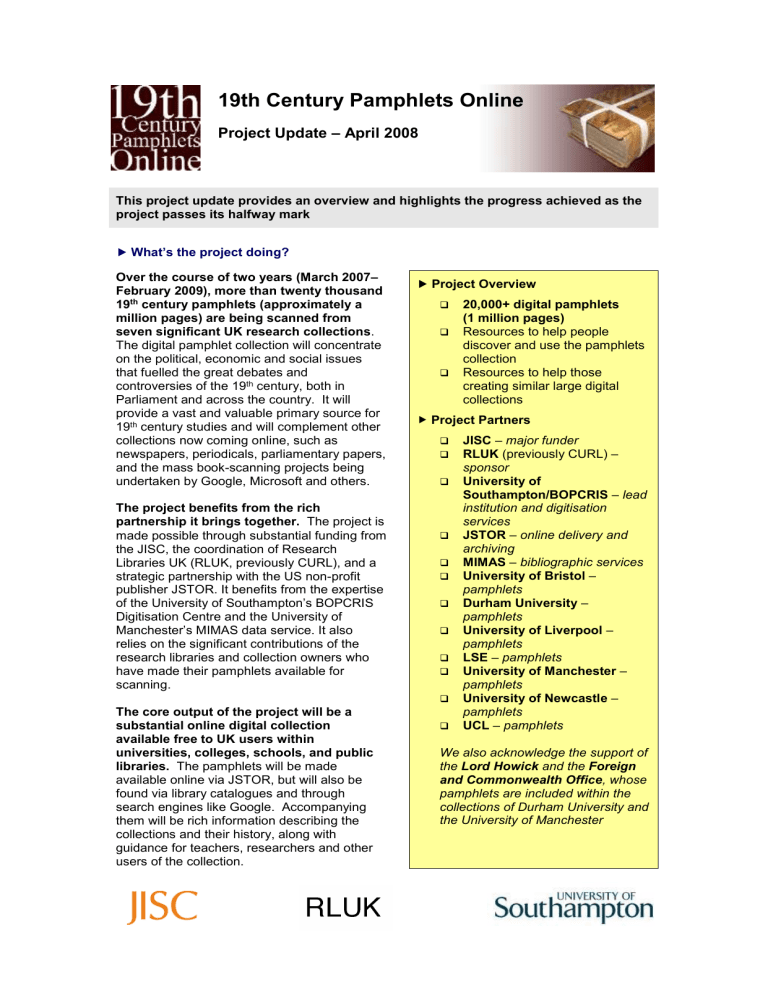
19th Century Pamphlets Online
Project Update – April 2008
This project update provides an overview and highlights the progress achieved as the project passes its halfway mark
What’s the project doing?
Over the course of two years (March 2007 –
February 2009), more than twenty thousand
19 th century pamphlets (approximately a
Project Overview
20,000+ digital pamphlets million pages) are being scanned from seven significant UK research collections .
The digital pamphlet collection will concentrate on the political, economic and social issues that fuelled the great debates and controversies of the 19 th century, both in
Parliament and across the country. It will provide a vast and valuable primary source for
19 th century studies and will complement other collections now coming online, such as newspapers, periodicals, parliamentary papers, and the mass book-scanning projects being undertaken by Google, Microsoft and others.
The project benefits from the rich partnership it brings together.
The project is made possible through substantial funding from the JISC, the coordination of Research
Libraries UK (RLUK, previously CURL), and a strategic partnership with the US non-profit publisher JSTOR. It benefits from the expertise of the University of Southampton’s BOPCRIS
Digitisation Centre and the University of
Manchester’s MIMAS data service. It also relies on the significant contributions of the research libraries and collection owners who have made their pamphlets available for scanning.
The core output of the project will be a substantial online digital collection available free to UK users within universities, colleges, schools, and public libraries.
The pamphlets will be made available online via JSTOR, but will also be found via library catalogues and through search engines like Google. Accompanying them will be rich information describing the collections and their history, along with
(1 million pages)
Resources to help people discover and use the pamphlets
collection
Resources to help those creating similar large digital collections
Project Partners
JISC – major funder
RLUK (previously CURL) – sponsor
University of
Southampton/BOPCRIS – lead institution and digitisation services
JSTOR – online delivery and archiving
MIMAS – bibliographic services
University of Bristol – pamphlets
Durham University – pamphlets
University of Liverpool – pamphlets
LSE – pamphlets
University of Manchester – pamphlets
University of Newcastle – pamphlets
UCL – pamphlets
We also acknowledge the support of the Lord Howick and the Foreign
and Commonwealth Office, whose pamphlets are included within the collections of Durham University and the University of Manchester guidance for teachers, researchers and other users of the collection.
19 th Century Pamphlets Online Project
What’s significant about the project?
The new digital pamphlet collection will provide wide access to a substantial and important 19 th century resource that has been under-utilised due to difficulties of access . Although some 19 th century pamphlets are available through microfilm and a few have been digitised, most are locked away in stores or archives.
The project builds on a previous large, three-year pamphlet cataloguing project (1999-
2002), without which this current project would not have been feasible . This current project extends the earlier one, enabling users to discover a pamphlet via a catalogue or search engine and then click through to see the full digital copy. It also enables many of the libraries that worked together on the previous project to undertake further collaboration.
The project builds on many years of exp erience of the University of Southampton’s
BOPCRIS Digitisation Centre (www.soton.ac.uk/library/bopcris/) . BOPCRIS has most recently scanned and indexed a million pages of 18 th century parliamentary papers – see www.parl18c.soton.ac.uk. The Centre uses the latest technologies and standards to create high quality digital collections that will last well into the future. As well as aiding this current project, the tools and methodologies BOPCRIS develops during the project will be made available to others undertaking similar work.
Another key aspect of the project is the involvement of JSTOR (www.jstor.org), a non-profit organisation dedicated to ensuring that scholarly materials are preserved and easily accessed by future researchers and teachers.
In order to fund its activities and grow its collections, JSTOR normally imposes subscription fees. The project will give JSTOR a copy of the digital collection and allow it to sell subscriptions outside of the UK in exchange for free access to UK universities, colleges, schools and the public via libraries and archives. This enables the project to put the funding received from the
JISC into digitising more pamphlets rather than expensive databases and websites. As part of
JSTOR’s collections, it also means that this collection will achieve a very high profile.
Project Significance
Enables access to important but under-utilised resources
Extends a previous large cataloguing project
Develops knowledge and expertise in digitisation techniques
Ensures ongoing preservation and access to the collection through a strategic partnership with a scholarly non-profit publisher
What’s happened over the past year?
The project has just entered its second and final year. Much of the first year was spent in preparation, although a third of the pamphlets have already been digitised.
The libraries have been busy checking and preparing their pamphlets for scanning. This work includes considering the pamphlet’s copyright status, seeing if it duplicates a pamphlet already sent by another library and ensuring that it is not too damaged or fragile to be scanned. Bristol and LSE have a further task of selecting which pamphlets to send from their very large collections of 19 th century pamphlets (see page 4 for descriptions of the collections).
Page 2 Project Update – April 2008
19 th Century Pamphlets Online Project
BOPCRIS began scanning in May 2007. The initial focus was on identifying potential issues and finding the best ways to address them. Towards the end of 2007 additional staff were brought in and new scanners were purchased, enabling the centre to move into full production. BOPCRIS is currently achieving as much as 20,000 pages a week, although this rate varies according to the complexity and fragility of the material. Some collections, for example, have tight or fragile bindings, requiring extra care. Others have foldouts or annotations that have to be carefully scanned and noted by staff. To date, the Knowsley collection from Liverpool and Cowen Tracts from Newcastle have been fully scanned and checked, along with subst antial proportions of UCL and Bristol’s collections.
JSTOR has been working with BOPCRIS to finalise the technical specifications, check the quality of the scanning (which has proved very high), prepare for the receipt of the very large datasets from Southampton and the generation of copies suitable for delivering on the
Internet. JSTOR has also been consulting with user groups to understand how people might want to search and use the pamphlet collection.
What’s coming up over the next year?
Selection, preparation and scanning of pamphlets will all continue over the next year, with the project well on track to achieve its target of a million pages by early 2009.
During its second year, the project is focusing particularly on the delivery and presentation of the pamphlet collection.
JSTOR is launching a completely redesigned and reconfigured website in mid 2008. The timing of this means that the new design can take into account the requirements of the pamphlet collection and provide it with some advanced functionality. We expect the first batches of pamphlets to be available well before the end of the project.
An educational consultant is being employed by the project to develop contextual and educational resources to help students, researchers and teachers make the best use of the collection. These will include guides to using the collection within
GCSE or A level courses and in undergraduate and postgraduate research.
MIMAS , who provide cataloguing and other bibliographic services, will be working to incorporate links to the digital pamphlets into Copac, the UK academic library catalogue, and other services.
MIMAS will also enable searching from the project’s educational resources.
As the collection starts to become available online, the project team will seek to provide as much publicity and visibility for the collection as possible , including organising a special event to focus on 19 th century pamphlets and their use. If readers of this update are aware of publications or events that could help with promoting the collection, please let us know (contact details on next page).
Project Update – April 2008 Page 3
19 th Century Pamphlets Online Project
Collections being digitised
Personal collections
Hume Tracts from UCL. Personal collection of Joseph Hume (1777-1855),
Radical Member of Parliament. Hum e’s collection covers the major political, economic and social developments and reforms taking place in Britain in the early part of the 19 th century along with the causes he particularly championed, such as universal suffrage, Catholic emancipation, a reduction in the power of the Anglican church and an end to imprisonment for debt.
Cowen Tracts from the University of
Newcastle. Personal collection of Joseph
Cowen (1829-1900). A social reformer and
Member of Parliament for Newcastle
(187386), Cowen’s pamphlet collection dates, mostly, from his active years from the late 1840s to early 1880s. The collection reflects his interests in social, educational and economic issues and includes much local material.
Family collections
Earl Grey Pamphlets Collection from
Durham University. Still owned by the family, this collection was largely accumulated by the 2nd, 3rd and 4th Earls
Grey. Charles was Foreign Secretary
(1806-07) and Prime Minister (1830-34).
Henry George was Under Secretary for
Home Affairs (1830) and the Colonies
(1830-34), Secretary at War (1835-39), and
Secretary of State for the Colonies (1846-
52). Albert Henry George was
Administrator of Rhodesia (1896-97) and
Governor-General of Canada (1904-11).
The Greys were particularly interested in parliamentary reform, colonial affairs and
Catholic emancipation.
Knowsley Pamphlet Collection from the University of Liverpool.
The
Knowsley collection reflects the political careers of the Earls of Derby. Edward
George, the 14th Earl, was successively
Irish Secretary (1830-33), Colonial
Secretary (1833-34, 1841-44) and three times Prime Minister (1852, 1858-59 and
1866-68). His son, Edward Henry, 15th
Earl, was Colonial Secretary and later
Indian secretary in his father's administration of 1858-59.
Party and interest group collections
Selections from the LSE Pamphlet
Collection.
LSE has a substantial number of 19 th century pamphlets. Among its pamphlets are comprehensive collections of political party materials, including election manifestos and political cartoons. There are also collections from pressure groups such as the Fabian Society, Imperial Federation
Defence Committee, Poor Law Reform
Association, Workhouse Visiting Society,
Liberal and Property Defence League, and from cooperative movements such as the
Cooperative Women’s Guild.
Selections from the University of
Bristol Pamphlet Collection.
Like the LSE,
Bristol has a substantial collection of 19 th century pamphlets, including the National
Liberal Club collection, with pamphlets from the libraries of Charles Bradlaugh, John
Noble, the Liberation Society, the Land
Nationalisation Society, the Cobden Club, and others. Bristol’s collection is especially strong on 19 th century commerce, economics, finance, politics, religion and sociology. In addition to publications by
Liberal Party members, it includes many pamphlets from other political parties.
Official collections
Foreign and Commonwealth Office
Collection from the University of
Manchester.
On deposit from the FCO, this collection comprises the earlier collections of the Foreign Office and the Colonial Office.
Both include rare publications from overseas.
The Foreign Office Collection consists largely of pamphlets sent back to London by
British ambassadors to help with policy formation. It is particularly rich in material related to South America, the Near East, and to the various great European political
“questions” of the 19 th century. The Colonial
Office Collection is chiefly comprised of pamphlets sent back from Britai n’s colonies, including some unique early material from
Australasia.
For more information: Grant Young
(grant.young@bristol.ac.uk) or Julian
Ball (J.H.Ball@soton.ac.uk)
Web link: http://purl.org/net/pamphlets/
Page 4 Project Update – April 2008

